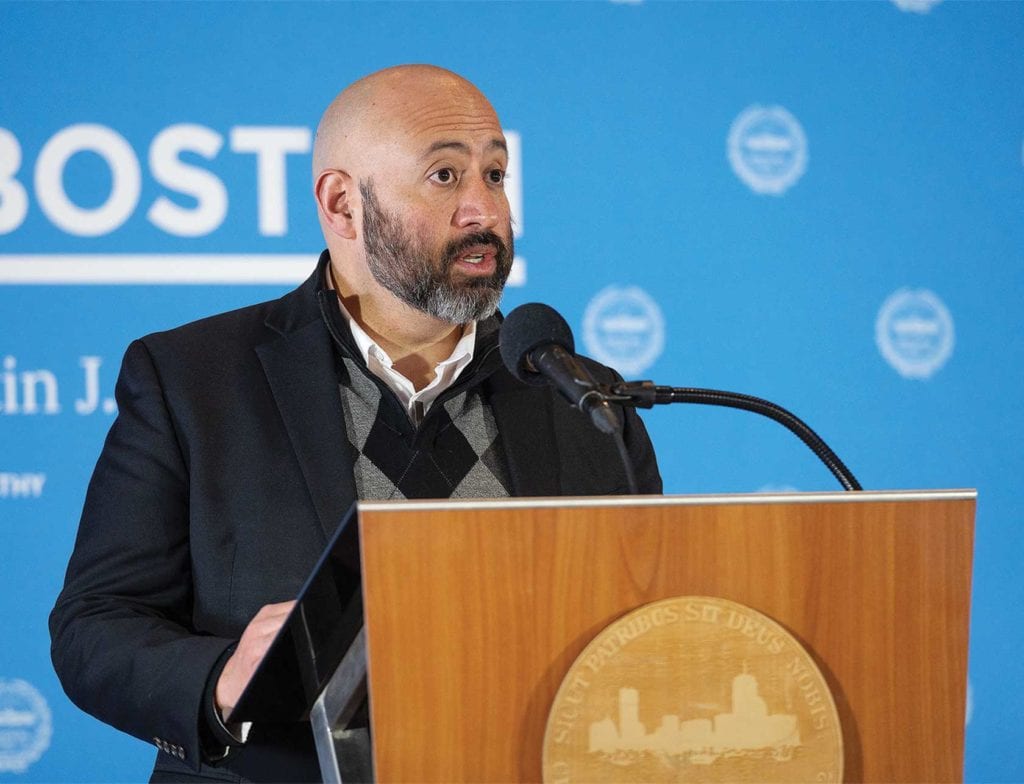Challenges facing Hub vaccine effort
Skepticism, lack of access remain issues

Elected officials and public health experts were sharply critical of the Baker administration’s initial roll-out of vaccine sites last week, with none located in the Black community where people have been hit the hardest by COVID-19 in Boston. But skepticism among community members could be an even greater factor inhibiting the dose rollout.
At a Boston Public Health Commission (BPHC) public virtual meeting on Jan. 20, the commission revealed the findings of its vaccine survey. In a survey of 145 respondents in Dorchester and Charlestown, 82.8% said they would take the vaccine, while 17.2% said they would not take it or are unsure. More than half of the respondents were white.
In a focus group of 78 Dorchester and Mattapan residents, 37% said they would not take the vaccine, and 16% said they were unsure. About 44% identified as Black or African American.
Though many said they would take it so they can return to some sense of normalcy or care for a loved one, others said they were unsure due to “lack of long-term evidence that the vaccine is effective” or “underlying health conditions.”
Because of these results, the BPHC is working to increase vaccine confidence by partnering with other city agencies, faith-based organizations and community organizations to deliver messaging that encourages ease about the process.
In a letter to state government officials, hundreds of doctors across Massachusetts are now calling for a more targeted vaccine rollout for Black and immigrant communities, as numbers continue to be highest in neighborhoods with high Black or African American populations.
“Prioritizing hotspot communities for offering vaccination is not just an effective way to block the spread of hyper-transmissible virus variants,” said Dr. Julia Koehler. “It’s also a matter of ethics and justice.” Koehler and Dr. Regina LaRocque authored the letter to Governor Charlie Baker, Health and Human Services Secretary Marylou Sudders and Public Health Commissioner Monica Bharel.
“In Massachusetts, 20% of doses in the second wave of vaccinations are purportedly set aside for residents of COVID-19 hotspots, but no program for delivering these vaccines is in place. As we have already experienced with the monoclonal antibody treatments for COVID-19, setting aside doses is insufficient to ensure that they actually reach marginalized communities,” the letter reads.
The letter was signed by 419 healthcare workers and community members. It had not received a response from the governor, Sudders or Bharel by the Banner’s Monday press deadline.
Koehler, an infectious disease researcher at Harvard, was upset with the way that Black and Latino populations have been overlooked during the pandemic.
“The lack of protection of Black and Latino communities, to me is just shocking and inhuman,” she told the Banner. She applauded the BPHC’s plan to connect with community organizations, who can do presentations within the community that answer frequently asked questions about the vaccine, but still thinks the state can do better.
“Black communities have very good reasons for their distrust. The tragedy that I see now, is that because of the abuse and neglect that they have suffered for the past decades and centuries, that now they’re going to be last to get the vaccine,” Koehler said.
Massachusetts is currently in last place for rate of vaccine distribution among New England states. According to the Bloomberg COVID-19 vaccine tracker, the state has used 45.7% of the doses, and have administered 392,967 shots out of the 859,175 shots delivered. Compared to New York and New Jersey, which have used 58.4% and 53% of their shots, Massachusetts is lagging even though it has fewer doses to give out.
On Monday, Governor Charlie Baker announced 103 publicly available vaccination sites to increase the state’s capacity to vaccinate. The state will have the capacity to administer 305,000 shots a week, but the actual numbers of doses given out will depend on distribution from the federal government and individuals’ willingness to be vaccinated. In addition to the mass vaccination sites at Fenway Park and Gillette stadium, a site at the Reggie Lewis Center will open in the first week of February. A map with all the new locations is available at mass.gov/COVIDvaccinemap, where users can find the closest location and sign up for an appointment if they are eligible in Phase One. Phase Two is expected to begin Feb. 1.
Michael Curry, president and CEO of the Massachusetts League of Community Health Centers, spoke at the governor’s press briefing, expressing confidence in the state’s equitable approach to vaccine rollout.
“I want to urge people to trust the science to get the facts, to not trust the misinformation that they get on social media and that they hear from, in many cases, their home communities, and to know the facts about this vaccine,” Curry said. “We were very clear and quick to acknowledge that the virus has not affected everyone equally.” The categories the state prioritized in the first phase — health care workers, individuals with underlying conditions, and prisons — all include large numbers of Black and Latino residents.






